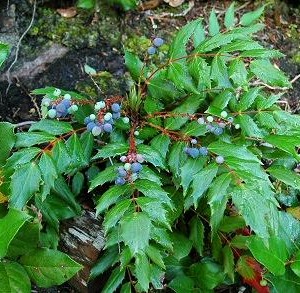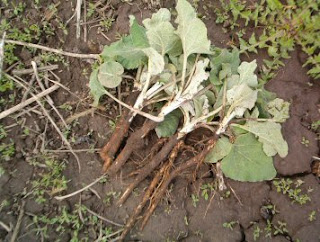I have allergies and am considering a
"liver cleanse," but do not know anything about them. I hear there
are some herbs that can be helpful. Can you please explain what such a cleanse
is and what I should be able to expect from it?
After your skin, your liver is the largest
filtering organ in the body. More than 200 functions have been identified. It
processes many substances to metabolize fats, proteins, and hormones, helps to
balance blood sugar, stores iron- and fat-soluble vitamins and helps clean toxins
from the blood.
Herbalists are very interested in liver
function. When we see clients with conditions such as allergies, skin problems,
tiredness, headaches, mood swings, problems with eyesight and hormonal
imbalances, we try to assess whether the liver needs support or protection. The
liver can become overtaxed with all the functions it has to perform, which
leads to the conditions called liver congestion or stagnation. The intake form
I use in my consultations helps me to make that assessment.
Some "liver herbs" stimulate the organ's function, while others calm and nourish an overworked liver and still others protect it. Hepatic herbs strengthen and tone the liver. Cholagogues promote the discharge of bile from the liver; the liver makes about a liter of bile a day, which is stored in the gall bladder until needed to digest fats.
Some "liver herbs" stimulate the organ's function, while others calm and nourish an overworked liver and still others protect it. Hepatic herbs strengthen and tone the liver. Cholagogues promote the discharge of bile from the liver; the liver makes about a liter of bile a day, which is stored in the gall bladder until needed to digest fats.
A liver cleanse can be mild or drastic. A mild one would be to drink a tablespoon of good quality apple cider vinegar in a glass of water first thing in the morning every day. Vinegar's sour taste indicates that it is an acid food with astringent properties that help detoxify the liver and digestive system. (See Catalyst article, "Herbal Vinegars," July 2005).
Adding more bitter flavors to the food you eat can also be helpful. Try some bitter lettuces like arugula.
Chocolate and coffee are also bitters. Swedish
bitters are available. The alkaline properties of bitter-tasting foods help the
cascade of digestive secretions to fire off in proper order.
Health food stores offer three-day liver cleanse kits. One of my students who worked in such a store told me that customers often returned this product with complaints that it made them feel awful and very angry. (The liver has often been called the seat of anger in the body. Liver imbalance can cause emotional excesses like rage, greed and resentment.) These preparations contain strong herbs that can have strong physiological effects with harsh reactions like nausea, diarrhea, pain, gas, mood swings, and exhaustion.
Usually, by the time clients call me for a consultation, they are not feeling very well. The last thing I want to do is stress the body further, so I avoid strong liver cleanses. I prefer instead to figure out which liver herbs are most appropriate for the person and combine those with remedies for their other health complaints to strengthen, nourish, balance and tone the whole body.
Many herbs affect the liver. If I could pick only five, these are the ones I would choose.
Picture of Herbs
- Dandelion: The leaves and roots have a mild stimulating effect on the liver. This diuretic herb does not leach potassium from the body, so it helps flush the system of toxins without creating other imbalances. Young leaves have a slightly bitter taste and taste great fresh in salads. On summer herb trips, I like to pick leaves from clean mountain meadows and make a vinegar tincture to drink in water or drizzle on salads for a mild cleanse.
- Oregon
Grape and Barberry: Both these herbs stimulate liver and skin functions.
They can be useful for acne, eczema and psoriasis.
- Burdock: This herb strengthens the
liver and purifies the blood. It is considered an alterative, which means
that over time, it can help to improve liver function and improve some
skin conditions.
- Milk
Thistle: This herb protects the liver; it's also a good antioxidant. It
promotes the flow of bile and is useful in cases of liver damage from
substance abuse.
- Turmeric:
This anti-inflammatory supports liver and gall bladder function. One study
showed that it reduced mortality from cirrhosis.
The herbs recommended here should not be mixed
with pharmaceutical drugs. They should not be taken by those with hepatobilary
disorders, liver disease or obstructions of the liver or gall bladder. Diet plays
a major role in liver health, so avoid fatty foods and eat apples and green,
leafy, chlorophyll-rich veggies, and drink healthy juices.
Herbal Bitters
Herbal bitters tonics are traditionally used for improving sluggish digestion and associated problems such as indigestion, flatulence and constipation. Bitter herbs such as dandelion root and gentian stimulate the flow of digestive fluids, while ginger and fennel sooth the gastrointestinal tract. Bitters tonics can be taken daily and are especially helpful for improving the digestion of large meals or meals containing proteins and fats. (Caution: People with high blood pressure should avoid licorice.)
1/2 ounce dandelion root 1/4 ounce gentian root 1/4 ounce licorice root 1/4 ounce fennel seeds 1/4 ounce dried ginger root 1/4 ounce dried organic orange peel 1/4 ounce cardamom pods vodka
Herbal bitters tonics are traditionally used for improving sluggish digestion and associated problems such as indigestion, flatulence and constipation. Bitter herbs such as dandelion root and gentian stimulate the flow of digestive fluids, while ginger and fennel sooth the gastrointestinal tract. Bitters tonics can be taken daily and are especially helpful for improving the digestion of large meals or meals containing proteins and fats. (Caution: People with high blood pressure should avoid licorice.)
1/2 ounce dandelion root 1/4 ounce gentian root 1/4 ounce licorice root 1/4 ounce fennel seeds 1/4 ounce dried ginger root 1/4 ounce dried organic orange peel 1/4 ounce cardamom pods vodka
Grind the herbs in a blender. Place in a glass jar and add enough vodka to cover the herbs, plus two inches. Close the jar tightly.
Place the jar in a warm, dark place, and give the jar a gentle shake every day or so to keep the herbs from settling. After three weeks, strain the liquid from the herbs through a colander or strainer lined with several layers of cheesecloth. Squeeze the herbs to strain out all of the liquid. Funnel your bitters tonic into a dark glass container, and store in a cool, dark place.
Take 1/2 to 1 teaspoonful of bitters tincture in 1/4 cup warm water 15 to 30 minutes before eating.











Good info, thank you.
ReplyDelete